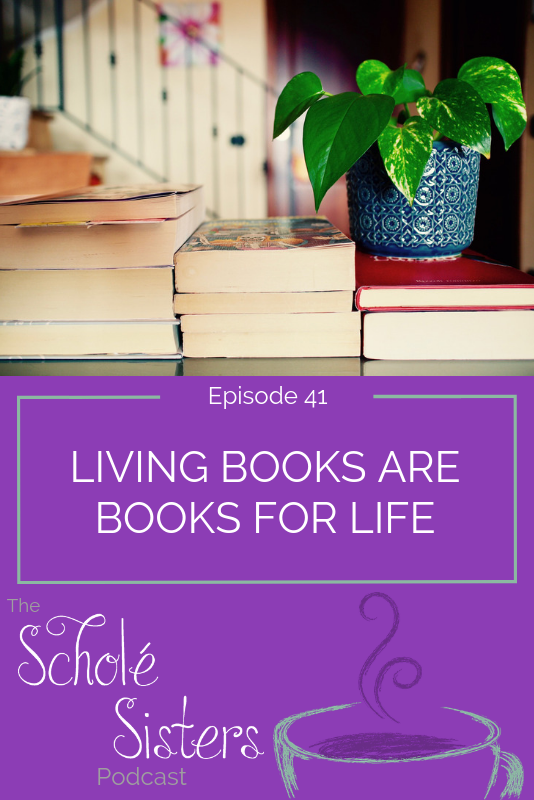SS #41: Living Books Are Books for Life
In today’s episode, Brandy, Mystie, and Pam kick off Season 7 of Scholé Sisters with a discussion about living books. What are they, what is their significance, and how can you identify them? This is a totally fun discussion about reading — and how picky should we be anyway? — that you don’t want to miss!

Thank you to our sponsor:
This episode is sponsored by two new podcasts from The Close Reads Podcast Network and the CiRCE Institute:
 First, there’s The Daily Poem, a brief podcast delivered each weekday morning featuring the best poems ever written. Consider it an audio anthology perfect for Morning Time, the morning commute, or while your toaster is doing its thing.
First, there’s The Daily Poem, a brief podcast delivered each weekday morning featuring the best poems ever written. Consider it an audio anthology perfect for Morning Time, the morning commute, or while your toaster is doing its thing.
 Second is The Play’s the Thing: All Shakespeare all the time. Join the Close Reads crew and the CiRCE Institute team as they work their way through Shakespeare’s entire canon one act a time. Up first King Lear, Much Ado About Nothing, and Henry V. Subscribe now wherever you get your podcasts.
Second is The Play’s the Thing: All Shakespeare all the time. Join the Close Reads crew and the CiRCE Institute team as they work their way through Shakespeare’s entire canon one act a time. Up first King Lear, Much Ado About Nothing, and Henry V. Subscribe now wherever you get your podcasts.
Listen to the podcast:
Podcast: Play in new window | Download
Show Notes:
- Scholé Every Day
- Brandy
In Memoriam: A Tribute to Charlotte Mason
Book Darts (also mentioned)
- Mystie
Leisure: The Basis of Culture by Josef Pieper
- Sunday morning corporate worship
- Pam
- What is Mitford?
The Abolition of Man by CS Lewis
- Who is Dr. Jason Jewell?
- Dance class
- Brandy
- Topical Discussion: Living Books Are Books for Life
Mere Motherhood by Cindy Rollins
The Great Tradition by Richard Gamble
- Sweet Valley High books
- Episode 35: Twaddlicious!
- YMB #3 Reading in Morning Time: A Conversation with Brandy Vencel
Charlotte Mason Volume 2
Charlotte Mason Volume 3
The Prince by Niccolò Machiavelli
Please leave us a review in Apple Podcasts!
If you upgraded to iOS 11, you’ll find leaving a review easier than ever. Just go to Scholé Sisters in your subscriptions and scroll down.











Just so you know viruses aren’t actually alive.
Oh, I don’t know. I’m not sure that I buy that they aren’t alive simply because they need a host to reproduce. I mean, I know they aren’t currently categorized as living, but that’s been debatable, right? 😉
If they aren’t living, they are at the very least active. 🙂
May I add to your discussion. 🙂 First, I very much enjoyed this episode! And can’t wait to be in retreat with you all on Saturday!!! From A Philosophy of Education page 78 in the pink book, in the chapter Authority and Docility….”There are those who have a right to lecture, those who have devoted a lifetime to some one subject about which they have perhaps written their book. Lectures from such persons are, no doubt, as full of insight, imagination and power as are their written works; but we cannot have a score of such lecturers in every school, each to elucidate his own subject, nor if we could, would it be good for the children. The personality of the teacher would influence them to distraction from the delight in knowledge which is itself a sufficient and compelling force to secure perfect attention, and seemly discipline.
I don’t think its really debatable. If you are really interested I could ask my husband to explain, as he could and would in excruciating detail, but I’ll try with a short version gleaned from living with him. Viruses are really just bits of protein floating around that plug into cells and have the cells replicate them. Prions are diseases which really are just bits of protein that mess things up. Viruses being the next step up have a protein coat, but they don’t have cellular structures. Cells being part of the definition of life. My husband’s favorite brain twister here is the idea that gametes are non living, they don’t have a complete (ie viable) genetic code, but the second they get together they are living. I think perhaps sometimes you have to get really excited about seemingly little tiny things that make a big difference in what something really is. I hope the explanation was comprehensible. I’m not the best at comments.
My husband suggested an interesting thought experiment regarding viruses so I thought I’d share. The characteristics of living things are reproduction, movement, growth, responding to stimulus, and carrying out metabolic activities (some include cellular structure but I’ll leave it out). Viruses could be said to respond to a stimulus but that is the only qualification for life that they meet. Fire on the other hand, which most agree isn’t alive, meets four of the five criteria. Now I’ll stop side tracking since simply replacing viruses with bacteria would completely nullify this conversation.
Yes, I was thinking about how we could replace it with bacteria and have it work … EXCEPT … I am suddenly fascinated by the idea that it is something that seems alive, but isn’t — and maybe that is actually the perfect analogy?
THANK YOU for adding this! ♥ I think the quote is perfect for the discussion!